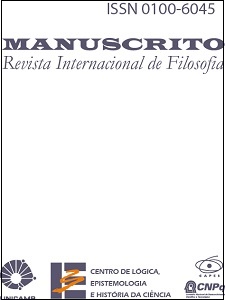Abstract
Há alguns modelos explanatórios proeminentes sobre o fenômeno semântico conhecido como restrição de domínios quantificacionais. Cada um destes modelos considera o contexto de proferimento como desempenhando um papel diferente. Uma forma particularmente clara e útil de organizar a discussão é proposta por Stanley e Szabó (2000), que distinguem três tipos de tratamentos, e argumentam em favor de um deles (i.e., aquele que eles chamam de modelo semântico). Neste artigo, eu procuro mostrar que nem os argumentos de Stanley e Szabó contra os tratamentos rivais nem o seu argumento em favor do tratamento semântico são conclusivos.
Abstract:
There are some salient explanatory models for the semantic phenomenon known as quantifier domain restriction. Each of these models sees the context of utterance as playing a different role. A particularly clear and helpful way of organizing the issue is offered by Stanley and Szabó (2000), who distinguish three kinds of approaches, and argue for one of them in particular (i.e., the one they call semantic model). In this paper, I argue that neither Stanley and Szabó’s arguments against the rival approaches nor their arguments for the semantic approach are conclusive.
Keywords: Quantifier. Context of utterance. Pragmatics. Binding. Hidden variables.
References
ALMOG, J., PERRY, J., WETTSTEIN, H. (eds.). Themes from Kaplan. Oxford: Oxford University Press, 1989.
BACH, K. “Conversational Impliciture”. Mind and Language, 9, pp. 124-62, 1994.
BACH, K. “Quantification, Qualification and Context. A Reply to Stanley and Szabó”. Mind & Language, 15, pp. 262–283, 2000.
BARWISE, J., COOPER, R. “Generalized Quantifiers and Natural Languages”. Linguistics and Philosophy, 4, pp. 159-219, 1981.
BEANEY, M. The Frege Reader. Oxford: Blackwell, 1997.
CAPPELEN, H., LEPORE, E. Insensitive Semantics. Oxford: Blackwell, 2005.
CAPPELEN, H., HAWTHORNE, J. “Location and Binding”. Analysis, 67, pp. 95-105, 2007.
FREGE, G. [1892]. “Über Sinn und Bedeutung”. Zeitschrift für Philosophie und Philosophische Kritik, 100, pp. 25-50. Reprinted and translated in Beaney (ed.) (1997), pp. 151-171.
GAUKER, C. “Domain of Discourse”. Mind, 106, pp. 1-32, 1997.
KAPLAN, D. “Demonstratives”. In: Almog, J., Perry, J., Wettstein, H. (eds.) (1989), pp. 481-563.
KAPLAN, D. “Afterthoughts”. In: Almog, J., Perry, J., Wettstein, H. (eds.) (1989), pp. 565-614, 1989a.
NEALE, S. Descriptions. Cambridge, Mass.: The MIT Press/ Bradford Books, 1990.
NEALE, S. “On Being Explicit”. Mind & Language, 15, pp. 284–294, 2000.
PARTEE, B. “Binding implicit variables in quantified contexts”. Papers from the Chicago Linguistics Society, 25, 342-65, 1989. Reprinted in Partee (ed.) (2004), pp. 259-277.
PARTEE, B. (ed.). Compositionality in Formal Semantics. Selected Papers by Barbara H. Partee. New York: Blackwell, 2004.
RECANATI, F. “Unarticulated constituents”. Linguistics and Philosophy, 25, pp. 299–345, 2002.
REIMER, M. “Quantification and Context”. Linguistics and Philosophy, 21, pp. 95-115, 1998.
RUSSELL, B. The Problems of Philosophy. Oxford: Oxford University Press, 1912.
SELLARS, W. “Presupposing”. The Philosophical Review, 63, pp. 197-215, 1954.
STALNAKER, R. “Reference and Necessity”. In: C. Wright and B. Hale (eds.) (1997), pp. 534-554.
STANLEY, J. “Context and Logical Form”. Linguistics and Philosophy, 23, pp. 391-434, 2000.
STANLEY, J., SZABO, Z. “On Quantifier Domain Restriction”. Mind and Language, 15, pp. 219-61, 2000.
WETTSTEIN, H. “Demonstrative Reference and Definite Descriptions”. Philosophical Studies, 40, pp. 241-257, 1981.
WRIGHT, C., HALE, B. (eds.). A Companion to the Philosophy of Language. Oxford: Blackwell, 1997.

